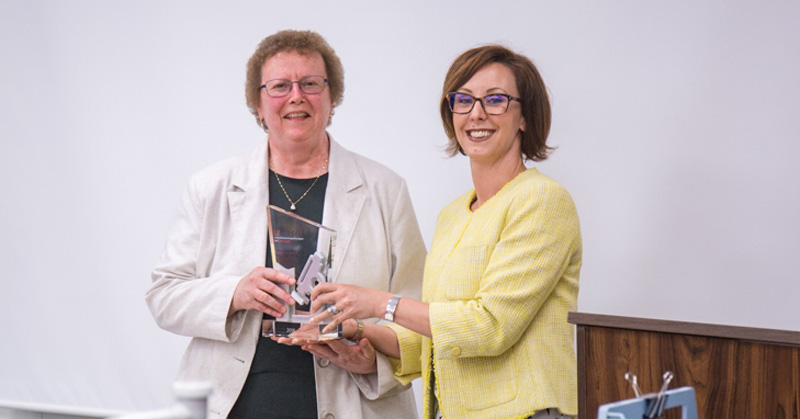


Laboratory professional of the year
Photo by Ashley Barnas June 11, 2018
Mary Ann McLane named Laboratory Professional of the Year by Cardinal Health
University of Delaware Department of Medical Laboratory Sciences professor Mary Ann McLane received the Cardinal Health™ urEssential Laboratory Professional of the Year Award, which recognizes the imperative contributions medical laboratory professionals make to patient care. McLane is the fifth winner of the award and was nominated by previous honoree Rodney Rodhe, professor and chair of the Clinical Laboratory Sciences Program at Texas State University.
The award comes with $25,000 as an educational grant to UD, which McLane will put toward students pursuing careers in medical laboratory science.
Cardinal Health, an integrated healthcare services and products company, said in a statement, “We recognize Dr. McLane as a truly outstanding leader, educator, professional and clinical laboratory scientist. Through it all, her passion for clinical laboratory science has been an inspiration — influencing thousands of students, patients and fellow laboratorians alike.”
McLane, who retired from UD following the Fall 2017 semester, wants the award money to have a unique twist. Part of the funding will go toward scholarships and students’ emergency needs like books and application fees, but she also wants to dedicate funding towards student active participation in The American Society of Clinical Laboratory Science (ASCLS).
“This society has been such a huge part of my career and is the connection with medical laboratory professionals around the world through our professional society. Some of the relationships that I’ve developed through ASCLS have been lifelong,” McLane said. “Students will be encouraged to go to our ASCLS dinner meetings, conferences and other networking opportunities. They might meet their employer. I want them to rub shoulders with our colleagues in the profession, so they can understand that the meaning of ‘professionalism’ goes beyond just doing a job.”
McLane will also focus a portion of the funds on student scholarships for UD’s medical diagnostics major, where undergraduates study a wide range of disease processes and patient diagnostic patterns and grow in an understanding of the critical role played by medical laboratory professionals who do the diagnostic testing.
“None of this is about me. This is totally about providing the face of the medical laboratory sciences profession and our incredible department here at the University of Delaware,” said McLane.
Busy in retirement
For those who know her, McLane’s “retired, but not really” mindset will come as no surprise. She is working on a National Institutes of Health grant called “eClinic: An Innovative Technology for Clinical Laboratory Sciences Education.” She is creating educational modules in areas that are taught, but not experienced by medical laboratory sciences students in clinical rotations. The lessons can also function as additional tools in an instructor’s repertoire of practical visual aids. McLane hopes these modules can become a model for medical laboratory sciences programs around the country to use. So far, she has developed six modules, including topics that employers are craving like mass spectrometry, automated urinalysis and acid-base results. The grant also includes pilot-testing of these modules to assess their educational outcomes.
“Some colleges and universities don’t have the resources to teach topics like mass spectrometry in their classrooms and laboratories. I’m hoping these recordings can help with that,” added McLane.
Using an inverted camera system in UD’s Faculty Commons, she also gives whiteboard lessons — available for use by institutions around the country. She has already recorded close to 50 lessons, which have become a student teaching tool in organizations like the University of Texas MD Anderson Cancer Center.
“I have always been a teacher that happens to do research,” McLane said. “I don’t think that I’ll ever stop teaching.”
Contact Us
Have a UDaily story idea?
Contact us at ocm@udel.edu
Members of the press
Contact us at 302-831-NEWS or visit the Media Relations website

